


Game Five looked to be the story of one particular AI leader: Mansa Musa. In the community predictions before this game started, we had almost two thirds of the entries select Mansa as the expected winner of this game. Long ago in the early days of Civ4, I wrote in one of my reports that Mansa Musa had the "winner" AI personality, just as Tokugawa had the "loser" AI personality. While Tokugawa refuses to sign Open Borders with anyone and stagnates in isolation, Mansa trades with anyone and everyone, fueling a rapid program of economic development. When tech trading is enabled, Mansa Musa is infamous for his rampant tech trading abilities. I've seen him squeezed into a corner of the map with four cities and still somehow end up being the AI tech leader in defiance of all logic. Here in AI Survivor with no Tech Trading enabled, Mansa has been somewhat reigned in while still being a teching powerhouse. His Financial/Spiritual combination seems to work very well in these games, with the AI saving lots of turns otherwise lost to Anarchy while picking up the awesome Financial commerce bonus. And although Mansa is one of the more peaceful leaders in the game, he also has the ability to plot war at "Pleased" relations, which makes him much more dangerous than many of the other peacenik AIs. This game would provide another opportunity to watch Mansa Musa in action.
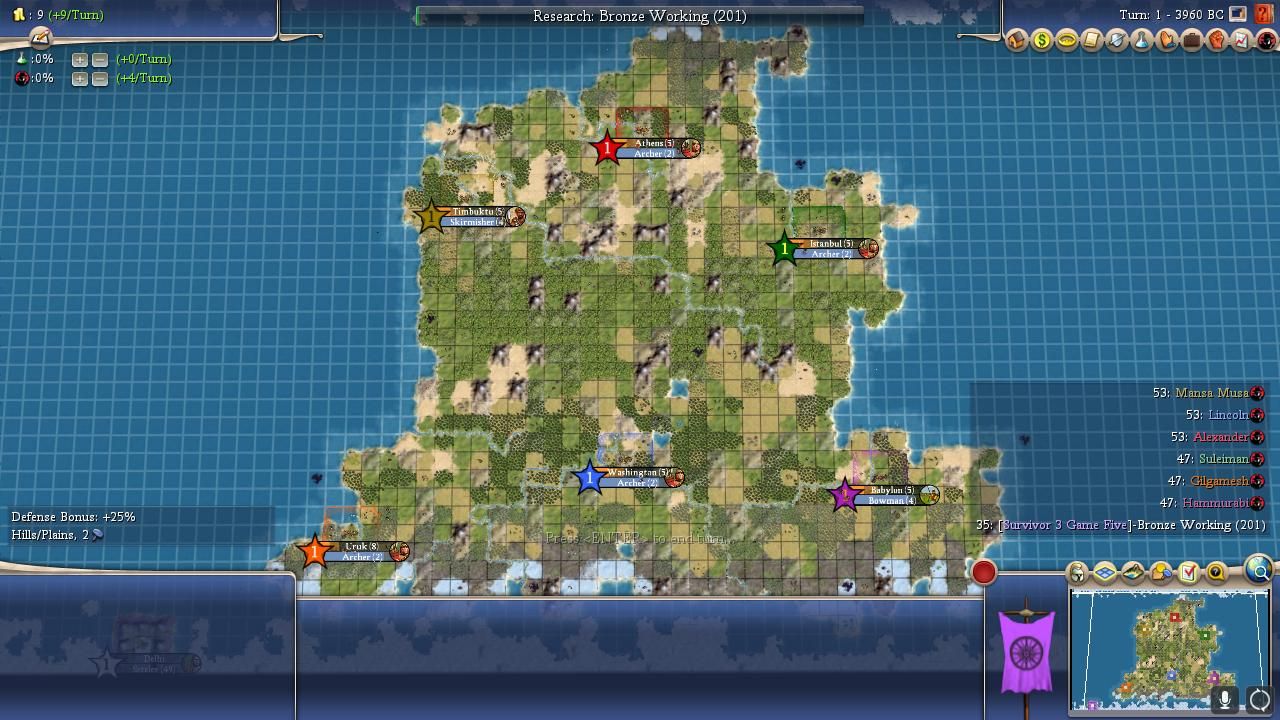
The Malinese civilization started out this game in the northwest corner of the continent. This was arguably a subpar location, with only a plains cow and a bunch of floodplains tiles for food, and with little room to expand in the north combined with large tracts of jungle to the south. Mansa would also have to contend with Alexander of Greece, one of the game's most aggressive leaders, nearby to the east. Of course, these two leaders had started in very similar positions last season in Game Six, and that contest ended in a Mansa Musa romp. We'd have to see if Alexander could do better this time. Further to the east was Suleiman of the Ottoman Empire, an Imperialistic AI who was one of the dark horse picks in this game. A lot of people liked him to come in second place, and Suleiman would have a good chance in this game if he could spread out like the plague along the eastern edge of the continent. Down in the south were two very peaceful leaders who like to sit back and build things (Lincoln/Hammurabi) and one highly aggressive leader who favors warfare (Gilgamesh). It was a certainty that the massive difference in peace weight between these three civs would spark conflict, and I doubted that all three of them would survive until the finish.
None of the leaders in this game started with Mysticism tech, creating an open competition for the first two religions. Mansa Musa seemed likely to claim one of them due to his heavy religious preferences, but he opened with a growth-oriented Bronze Working into Animal Husbandry tech path instead. It was Hammurabi who went for the Meditation religion first and established Islam in his second city. Then when no one else made any immediate move for a religion, Hammurabi would go on to found the Polytheism religion (Buddhism) in his THIRD city. I don't think we've ever seen the same AI leader found both of the first two religions before in AI Survivor. This created a weird game where there was effectively only one dominant Islamic religion that spread throughout most of the world. When the Monotheism religion was founded later on Turn 47, it was Gilgamesh who picked it up down in the far southwest corner of the map, which limited its spread. This would cause serious diplomatic problems for Gilgamesh in a world where Islam was dominant.
The AI leaders generally expanded in logical fashion once again in this game. Lincoln sent his first settler to the southeast while Suleiman went due south, creating a large open space in the center of the map where barbarians flourished. Gilgamesh and Hammurabi both expanded to the north and picked solid spots with their own settlers. And as for Mansa and Alexander:

They settled right on top of one another with their first few cities. It's hard to think of a situation more likely to guarantee future conflict than this. Mansa and Alex were both racing to see who could claim the middle of the continent, and whoever won had the potential to cut the other one out of the picture entirely. We initially thought that Djenne would lock Alex out of the center, only to see him push out an early settler for his third city and settle Corinth a mere three tiles away to the northeast. Since Mansa has an extremely high peace weight score (9) and Alex has a very low peace weight (0), these close borders practically made war an inevitability. Over the following turns Alexander continued to do much better than expected, planting his fourth city to the east of Djenne and then another city even further south. The Greeks were the first civ to reach three cities, then the first to four cities, then first to five. Meanwhile, Mansa planted his third city in the far northwest directly on top of the stone resource. This gave him both stone and marble, sending Mansa into wonder-building mode. He cranked out first the Great Wall followed by the Pyramids. Mansa appeared to be wasting precious early game production on wonders instead of pushing out more settlers for expansion. This part of the map was not going the way that we expected at all.
In the south, Lincoln appeared to be doing the best in the early game. He was expanding quickly in all directions and faced little opposition from his two neighbors. Hammurabi was focusing too much on religion, researching both Polytheism and Meditation techs and delaying important growth-oriented research objectives (Bronze Working, Pottery, Animal Husbandry) as a result. Then he also built Stonehenge, which wasn't something that the Babylonians needed with two early religions already in hand. In the far west, Gilgamesh decided to spend two of his first four settlers on locations down in the tundra that easily could have been claimed later. Those settlers would have been much better used claiming land along the American border rather than grabbing iceballs that would never be worth very much. This should have left available the central part of the map for an aggressive landgrab from Suleiman and his Imperialistic trait. However, Suleiman had idiotically locked himself into a trap of his own AI programming. He was building a settler in his second city, a jungle-choked location stuck at size 1 with precisely zero production capability. So long as that settler was in production, the Suleiman AI thought it was "expanding" and refused to start another settler in the capital. As a result, Suleiman sat on two cities for several dozens of turns on end, falling far behind the rest of the field. We've derisively referred to Suleiman as "Sillyman" when he's done stupid things in the past, and this was another case of the AI smoking some of the pungent weed. 
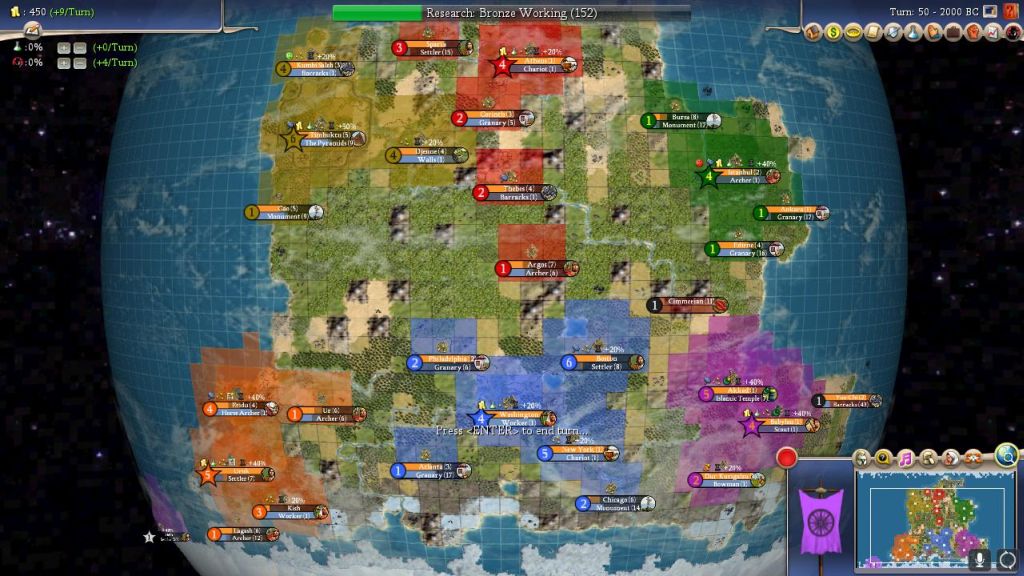
By Turn 50, Lincoln and Alexander appeared to be leading the field. Lincoln was leading in score with six cities and a settler for a seventh under production. At this point, I was starting to wonder if we had all targeted the wrong peaceful AI in this game; maybe it was Lincoln who was destined for glory in this match. Alexander appeared to be replicating the path to success that Hannibal and Justinian had followed in the last two AI Survivor games, starting in the north and then settling straight towards the central part of the map. With a substantial tundra backlines still to claim, Alex looked certain to end up with about ten cities and more land than anyone else. Gilgamesh was lingering as a threat in the south, although his tundra city placements left a great deal to be desired. Hammurabi had been slowed by his religious stuff and Mansa had been slowed by his wonder building spree. The Malinese were almost done with the Pyramids though, and due to some good luck there was still a lot of jungle to the south that remained to be claimed. I still thought Mansa had a decent chance although this had been a bit of a rough opening for him. Finally Suleiman was desperately pumping out settlers now but he was extremely far behind, last place on the scoreboard by a wide margin. The weak placement of his second city and Suleiman AI's refusal to build another settler until that city had completed the first one had essentially crippled his game. Coming back from this disastrous opening was going to be a herculean task.
The map continued to fill up over the following turns. Mansa finished the Pyramids and immediately swapped to Representation civic, where he would stay for most of the game. That probably made the Pyramids a worthwhile build, especially with the stone resource available. The AI loves to run specialists in Civ4 and the extra happiness from Representation helps them a lot in the early game. (You would think that the Deity AI would be able to manage happiness in their cities given the huge bonuses that they get, but they struggle with happiness constantly. Early luxuries like ivory, furs, and gold resources help out their performance a lot.) Mansa then proceeded to crank out two settlers at once and claim two cities in the southern jungle. That brought him back even with the rest of the pack, if still trailing Lincoln by a good margin. Gilgamesh went ahead and built the Oracle, while Hammurabi slowly settled the backlines territory in his southeast corner. Suleiman was finally making use of his Imperialistic trait and managed to claim most of the remaining territory between him and Alexander. Now why couldn't he have done that two dozen turns earlier?
We expected Alexander or Gilgamesh to start the first war against their respective neighbors. Instead, it was shockingly Mansa Musa who started the first conflict on Turn 78 by moving a stack next to Corinth. And unlike so many of those failed early wars in Civ4, this one was timed perfectly:
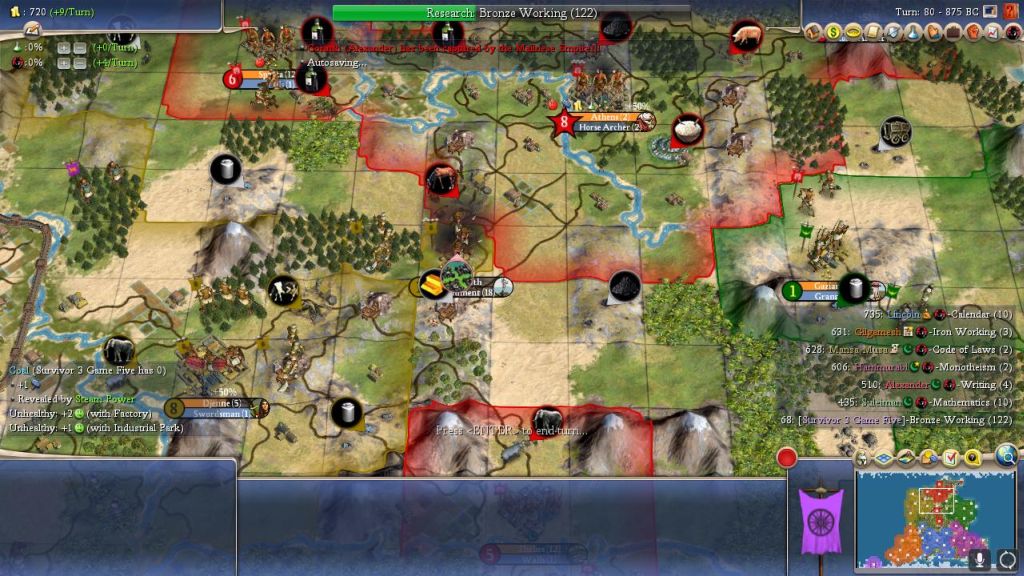
Corinth had no culture inside and no city walls when Mansa declared war. As a result, it was easy for Mansa Musa to take it over with his stack of swords and axes. This capture neatly bisected Greek territory into two halves, separating Alex's two southern cities from his four northern cities. It became clear immediately that Alex was in real danger from this invasion. Corinth contained his only source of horses, and if the Malinese borders were able to expand to take over that resource, the Greeks would be unable to build chariots or horse archers. Also, notice how there seemed to be a lot of Greek mounted units running around? It turned out that Alexander had no copper or iron resources connected to his trade network. He did have an iron resource sitting just outside one of his northern cities in the second ring, but get this: Alexander had never researched Mysticism tech. 

 Seriously. As late as Turn 100 he still didn't have Mysticism tech. That meant no monuments to expand borders, nothing on the religious part of the tech tree, and libraries as the only means of generating culture. I'm not sure that I've ever seen an AI this incompetent at city development before. So Alex was crippled by having no cultural defenses outside of his capital and no axes on hand to counter Mansa's swords, which were slicing through the Greek archers and chariots on defense with great abandon. This was an absolute disaster for Alex, and it turned out that Mansa had chosen the ideal moment to invade his neighbor.
Seriously. As late as Turn 100 he still didn't have Mysticism tech. That meant no monuments to expand borders, nothing on the religious part of the tech tree, and libraries as the only means of generating culture. I'm not sure that I've ever seen an AI this incompetent at city development before. So Alex was crippled by having no cultural defenses outside of his capital and no axes on hand to counter Mansa's swords, which were slicing through the Greek archers and chariots on defense with great abandon. This was an absolute disaster for Alex, and it turned out that Mansa had chosen the ideal moment to invade his neighbor.
Somewhat surprisingly, there were no other wars in this game during the first 100 turns. Mansa Musa built Chichen Itza (founding Taoism as the Code of Laws religion), and that proved to be a useful wonder in his war against Alex. The city of Corinth was right on the Greek border and didn't control half of its first ring tiles, but it was able to pick up the +25% defenses from Chichen Itza, followed by another +50% defenses from a cheap stone-discounted city walls, and that made it essentially invulnerable to repeated Greek counterattacks. Meanwhile, Mansa sniped off another one of the isolated Greek cities in the south and used his marble to build the Mausoleum three turns before Lincoln could built it. That was another key wonder that was helping Mansa to catch up to the Americans and close the gap with their early lead. Soon Lincoln was involved in his own war:

Gilgamesh initiated the conflict that had been inevitable since this map was rolled on Turn 105. I failed to capture the main Sumerian stack in this screenshot, which was directed against the American city of San Francisco in the northwest corner of Lincoln's empire. That city fell immediately to Gilgamesh, and this looked like it might be a successful invasion. However, this is where peace weight has to be kept in mind, and its role in shaping how the AI vs AI diplomacy plays out. Gilgamesh has a very low peace weight while Lincoln and Hammurabi both have very high peace weight scores. Similar peace weights made Lincoln and Hammurabi great friends who would almost never attack one another. As a result, when Hammurabi intervened in the war it was a certainty that he would come to Lincoln's aid, which came to pass on Turn 116. Now the Sumerians were forced to fight against both of the AI civs in the south, and Gilgamesh wasn't strong enough to pull that off. San Francisco was recaptured and the Sumerians were forced to fall back on the defensive. It's also worth taking a look at the religious landscape in the corner of that screenshot. There were five Islamic nations... and then poor Gilgamesh with his own self-founded Confucianism. He was on the wrong side of the religious divide and things were only going to get worse from here.
In the north, Mansa's onslaught against Alexander continued. He captured Sparta on Turn 107, and then the push was on for the Greek capital. Mansa had picked up Construction tech by now and unlocked catapults, and the nearby presence of ivory was enough to put elephants into the field as well. Alex was able to counter with his own elephants, which was a good thing since he soon lost his only source of horses to Malinese culture. Fortunately for him, Greek borders finally expanded to pick up the iron resource and bring metal units into play for the first time. Mansa was cottaging up a storm back in his core, and that combined with the early Representation civic from the Pyramids was causing his tech rate to explode. Mansa's initial strike against the city of Athens came up short, so he simply came back again with maces this time and sealed the deal:
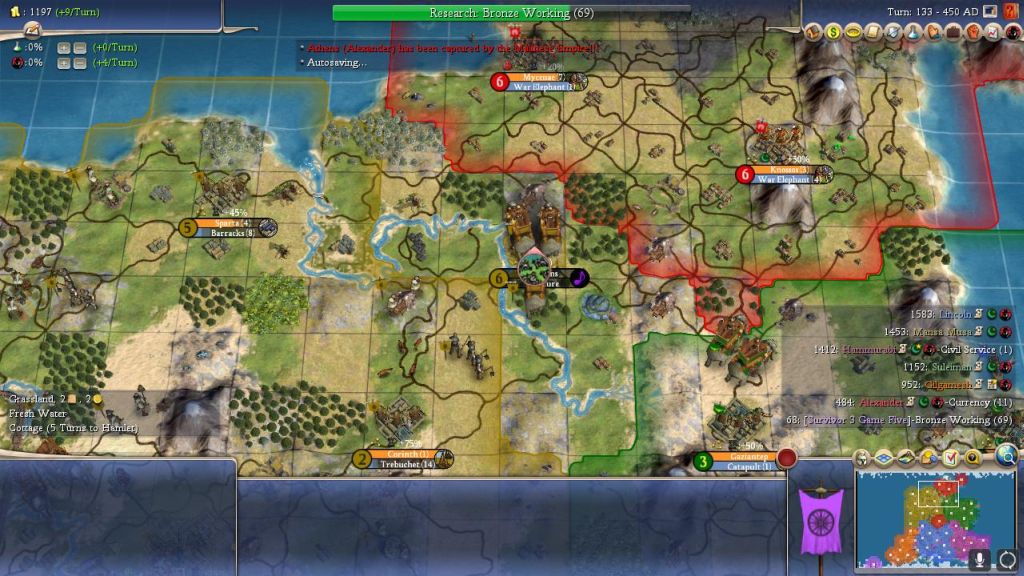
Note that Alex's only iron source (directly below the "has been" text in the above screenshot) has been pillaged and disconnected again. If it weren't for an ivory resource at the isolated Greek city in the south, Alexander would have been unable to build anything but archers. His lack of key strategic resources - mostly due to his own incompetent city management - had been a huge issue in this war. Now the game was beginning to turn into a race as to who could get more out of their respective wars. It seemed certain that Mansa would conquer the remaining Greek cities eventually. Could Lincoln manage to do the same thing and absorb Gilgamesh's territory? The complicating factor here was the presence of Hammurabi, who was "helping" Lincoln in the war but also threatened to take some of the Sumerian cities for himself. In fact, the first Sumerian city to be captured went over to the Babylonians, not the Americans. I'm sure Lincoln was rolling his eyes at that kind of assistance.
Then things were further complicated in the south by the entrance of the game's forgotten AI leader, as Suleiman declared war on Hammurabi on Turn 139. He managed to capture the Babylonian city on their respective border at the same time that Mansa was wiping out the southern Greek enclave:

The big winner here appeared to be Lincoln, who would now have the opportunity to clean up the remaining Sumerian cities once Hammurabi recalled his forces for home defense. Only - that didn't happen, as Hammurabi continued to attack Sumerian cities despite the Ottoman invasion. In fact, three of the first four Sumerian cities to fall were captured by the Babylonians, even as their core was getting pillaged back at home. What the heck was Hammurabi doing?! This was a troll job right up there with Wang Kon from last year's AI Survivor. Madness. 
As if things weren't going bad enough for Gilgamesh, he soon learned why it's a bad idea to be the only Confucian leader in a world full of Muslims:
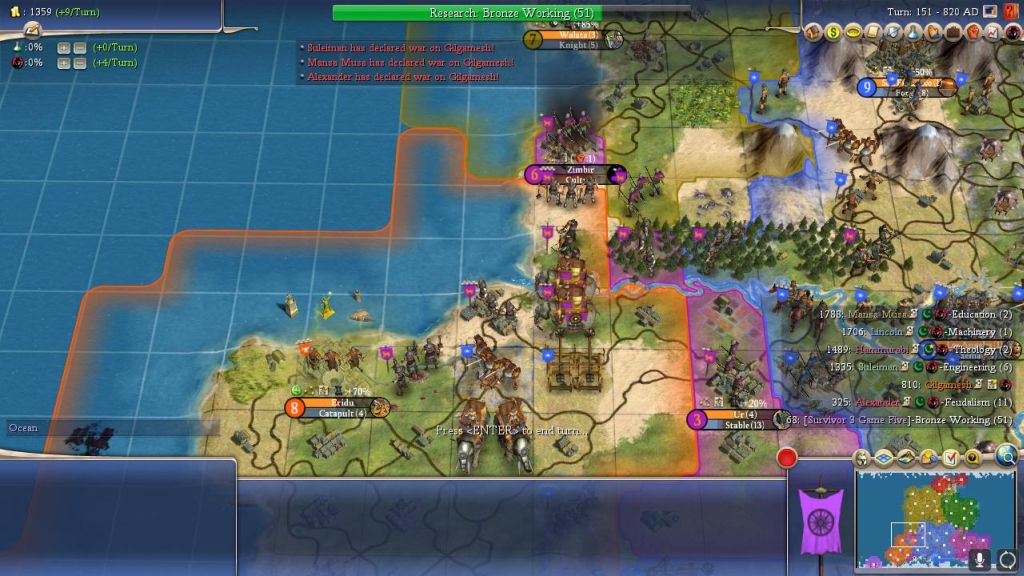
The Apostolic Palace strike again! Hammurabi had used his control of the wonder to force a war declaration of everyone else against poor Gilgamesh. If he hadn't been doomed already, he certainly was finished now. Nothing changed for the moment in practical terms, since Suleiman was too far away to invade and Alex certainly wasn't sending any soldiers. Mansa Musa would look to get involved here though, once his current invasion of Greece was over. We had a race on our hands for the First to Die category, whether the combined forces could finish off Gilgamesh or if Mansa would emerge victorious in his lonely struggle against Alex. This was a surprisingly close contest as huge armies congregated on the remaining cities of the outgoing leaders.
As it turned out, Mansa Musa won the race and eliminated Alexander first:

Solo kills are relatively rare in AI Survivor because of how difficult they are to pull off. It's more common for leaders to be eliminated in a fashion similar to Gilgamesh in this game, brought down by a combination of multiple wars over a long time or invasions from more than one party. The unusual solo kills tend to be the most valuable though, since all of the spoils of war go to a single leader. Mansa now controlled a huge empire that stretched across the top of the map, and with his awesome economic traits, a bevy of powerful wonders, and the most territory in the game, he was about to leave the other AI leaders in the dust.
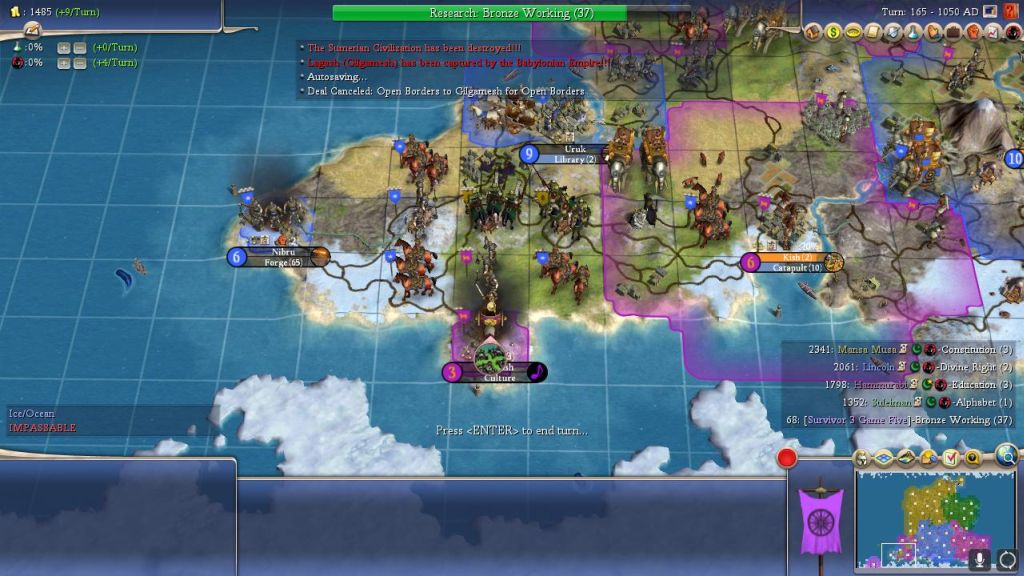
Gilgamesh was thrown out of the game only five turns after Alex, with Hammurabi narrowly claiming the kill. There were large American and Malinese forces right next door who had also been chomping at the bit to take that last city. This had been a bit of a tough game for Gilgamesh and Alexander, as two low peace weight leaders in a game with three high peace weight opponents. Still, it wasn't outside the realm of possibility that they could have come out on top in this game, especially if Suleiman had played a more competent game and joined them. Gilgamesh had been crippled in this game by the forces of religion, with Hammurabi's hoarding of the early faiths causing a universal Islamic block that hated the Sumerian practice of Confucianism. Mansa Musa had founded two other religions and wisely avoided swapping to either of them. As for Alex, he had mostly been done in by his own incompetence. He was making 13 beakers/turn at a time when Mansa was making 80 beakers/turn, and when we checked again later, it was something like 35 beakers/turn against 200 beakers/turn. That was never going to end well for him, even without his baffling lack of culture and horrendous resource management. Alex deservedly won his Darwin Award for this game.
Of course, now that the two aggressive AI leaders were gone from the game, we ended up with the natural result of having a lot of peaceful builders in the game: a long period of peaceful building.
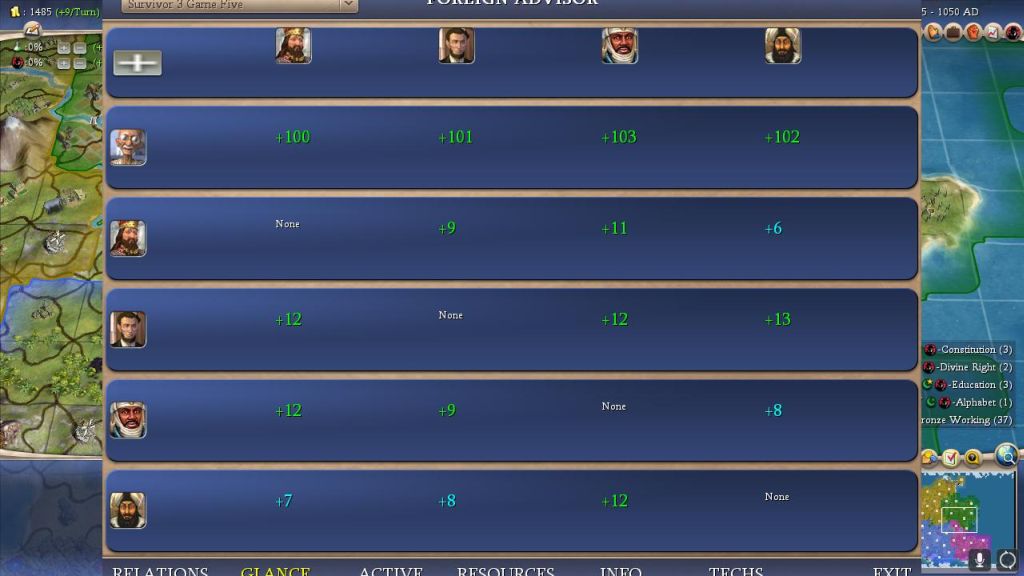
That's a picture of the diplomatic relations screen, an indication of how all the leaders felt about one another. This is color-coded with green marking "Friendly" relations, the highest they will go, and then on down to "Pleased" in blue, "Cautious" in white, "Annoyed" in purple, and "Furious" in red. Of course, everything here was either "Pleased" or "Friendly" and that was kind of the point. Shared Islamic faith and shared military struggle against Gilgamesh had made this one big happy lovefest. Even Hammurabi and Suleiman were on good terms despite their earlier war, which had ended after a short time with no cities permanently changing hands. For the next 100 turns there was essentially no military action of any kind. Suleiman briefly declared war on Hammurabi on Turn 209, only to see the war ended in two turns via a likely Apostolic Palace peace initiative. The world remained at peace.
Mansa Musa had been only marginally ahead in score at the time that the warring ended. That began to change though, and he soon opened up a huge lead fueled by technological advances. Mansa launched a series of Mausoleum-enhanced Golden Ages and torched his way through the tech tree, picking up all of the game's most expensive techs in one or two turns apiece. By Turn 250 he was more than a full era ahead, entering the Modern era while everyone else was still midway through the Renaissance. We were watching the diplomacy screen to see where new conflicts might break out, and since Mansa will declare war at "Pleased", he could theoretically attack any of the other civs. He had gone to Free Religion civic and that dropped relations out of the "Friendly" range where no AIs will attack one another. None of the three other AI leaders in this particular game will attack at "Pleased", but Suleiman had dropped to "Cautious" with Hammurabi and could potentially launch a new war as well. Nothing much seemed to be happening though, as everyone stayed peaceful and built infrastructure in their cities. When Mansa launched his spaceship on a fantastically early Turn 271, it looked like we were going to reach the end of the game without further conflict.
But then for no reason at all, Mansa declared war on Lincoln on Turn 280:

Whoa!  Maybe he just got bored after launching the spaceship and wanted a new challenge. Suleiman also declared war on the same turn, bringing our total war declaration counter up to ten for the game. This attack had one very real consequence, as it dropped Lincoln's score below Hammurabi's in the extremely close race for second place. The two of them had been neck and neck for a while, only to see Lincoln eventually pull away and reach a comfortable lead of about 250 points. However, with Mansa's massive armies of tanks and mechs smashing their way through the border, Hammurabi was catapulted into second place and reached the playoffs through dumb luck. This was one of the closest score races for second place that we've ever seen, with a last second change in the scoring.
Maybe he just got bored after launching the spaceship and wanted a new challenge. Suleiman also declared war on the same turn, bringing our total war declaration counter up to ten for the game. This attack had one very real consequence, as it dropped Lincoln's score below Hammurabi's in the extremely close race for second place. The two of them had been neck and neck for a while, only to see Lincoln eventually pull away and reach a comfortable lead of about 250 points. However, with Mansa's massive armies of tanks and mechs smashing their way through the border, Hammurabi was catapulted into second place and reached the playoffs through dumb luck. This was one of the closest score races for second place that we've ever seen, with a last second change in the scoring.
If Mansa had declared war a dozen turns earlier, this game might well have ended via Domination. Instead, the Spaceship arrived in Alpha Centauri two turns after the war began and the game ended that way:
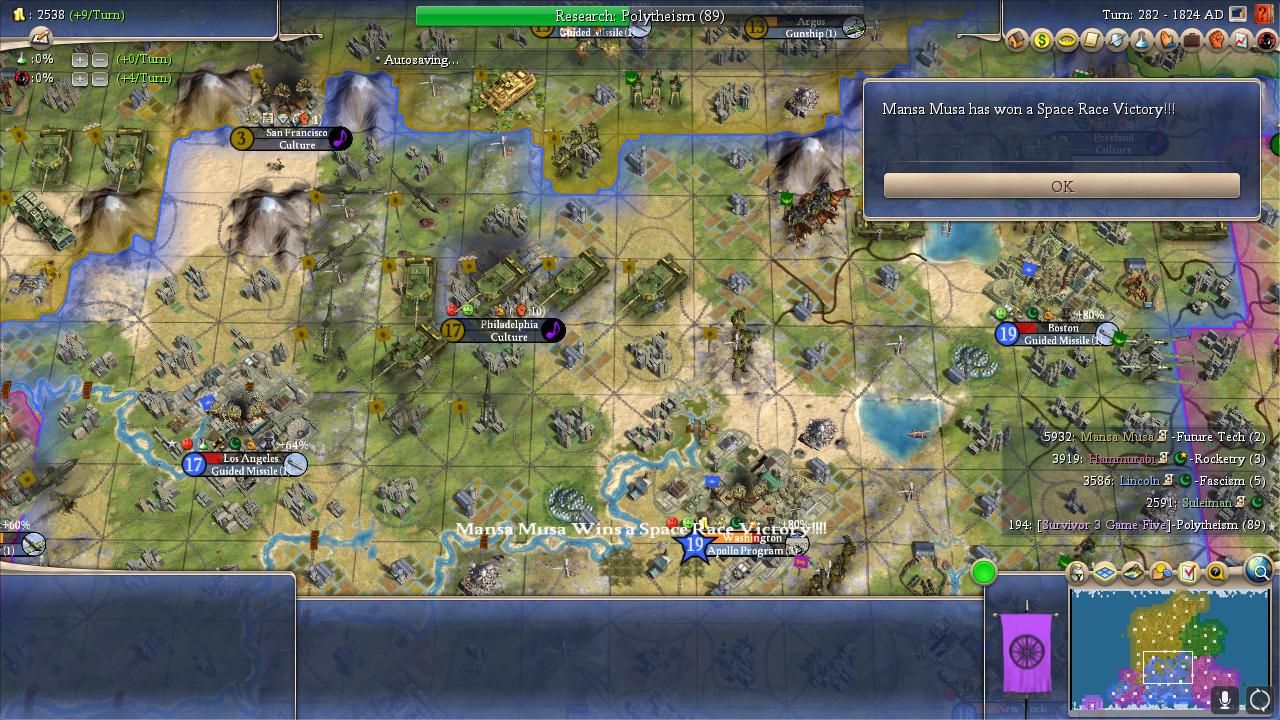
We therefore ended up with an exiciting initial 150 turns of the game, followed by a long peaceful lull, and then a last second bang right before the finish. Mansa emerged from a rocky opening to dominate this game in convincing fashion, his fourth win now in six total games played. We seem to be compiling more and more evidence that he's one of the game's best AI leaders. As far as the picking contest goes, these last second shenanigans ended up delivering me a win in the scoring for this game (tied with Old Harry who had the same score). I had picked Hammurabi to finish in second place, and the Livestream viewers teasingly accused me of rigging the outcome with that ending war. Well, I wish that I could plan things that well, heh. There's always a lot of luck in these games and it happened to break my way here. Mansa could have invaded Hammurabi just as easily at the end, or simply attacked 20 turns earlier and won via Domination instead of Spaceship. I've been pretty good at the picking contest over the last two seasons but I'm not THAT good to foresee a Turn 280 invasion right before the spaceship arrives.
Coming up in the playoffs, we'll now get to see Mansa in the same game as Gandhi in the ultimate build-a-thon. That should be a lot of fun in a few weeks. Thanks again for reading.



